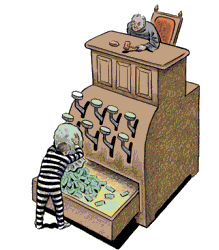 “Do the crime, pay the fine.” A little different, right? Many are unaware that when convicted of breaking the law, not only do people “pay” for their crimes by doing time, but they are also forced to pay up financially. The costs include court processing, defense attorneys, paper work, and anything else associated with their incarceration and supervision. In fact, anyone convicted of any type of criminal offense is subject to fiscal penalties or monetary sanctions. (If you have ever paid a traffic ticket, for example, you have paid a monetary sanction.) Further, the base fine of, say, a speeding ticket or even a major criminal conviction is just a small portion of the total cost. There are fines, fees, interest, surcharges, per payment and collection charges, and restitution. Until these debts are paid in full, individuals who have otherwise “done their time” remain under judicial supervision and are subject to court summons, warrants, and even jail stays.
“Do the crime, pay the fine.” A little different, right? Many are unaware that when convicted of breaking the law, not only do people “pay” for their crimes by doing time, but they are also forced to pay up financially. The costs include court processing, defense attorneys, paper work, and anything else associated with their incarceration and supervision. In fact, anyone convicted of any type of criminal offense is subject to fiscal penalties or monetary sanctions. (If you have ever paid a traffic ticket, for example, you have paid a monetary sanction.) Further, the base fine of, say, a speeding ticket or even a major criminal conviction is just a small portion of the total cost. There are fines, fees, interest, surcharges, per payment and collection charges, and restitution. Until these debts are paid in full, individuals who have otherwise “done their time” remain under judicial supervision and are subject to court summons, warrants, and even jail stays.
As a result of interest and surcharges that accumulate on these financial penalties, this portion of a person’s sentence becomes permanent legal debt, carried for the remainder of their lives. And because so many who are arrested and convicted are poor, unemployed, homeless, or suffer from mental or physical illnesses, the fines just pile up—unable to be erased through bankruptcy—and tie them, indefinitely, to the criminal justice system. For them, debt is a life sentence.
Read more at The Society Pages